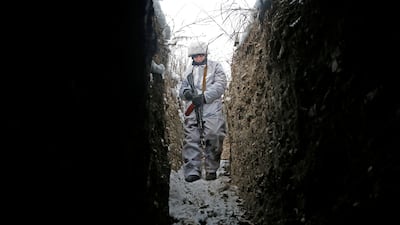As 2021 comes to a close, Russia has grabbed the world’s attention by massing nearly 100,000 troops along the border with Ukraine.
Yet thus far it has failed to frighten many Ukrainians. As I write in my apartment in central Kiev, just up the street hundreds of holiday revellers are sipping mulled wine, browsing knickknack stands and posing for Instagram photos at the lavishly decorated Christmas market in front of the Unesco-listed St Sophia Cathedral.
Perhaps they know they’ve got committed allies in the region and beyond. As I detailed in these pages last month, Turkey has backed Kiev on Crimea, where it has historical links to the Tatar community. It has also sold Ukraine its advanced drones, which have already made an impact on the battlefield.
US-based analyst Dmitri Alperovich, a cybersecurity expert and head of the Silverado Policy Accelerator, a think tank, believes that one of the incentives for any Russian military escalation against Ukraine would be to limit Turkey’s ability to strengthen Ukrainian forces. Russia’s President Vladimir Putin, he writes, “observed the Karabakh War last year and has a good appreciation for what a military armed with modern Nato weapons, such as Turkish TB2 drones, can do to retake territory”.
Leading American political scientist Francis Fukuyama concurs. “Ukraine’s use of Turkish drones could be a complete game-changer,” he recently said, “which is why Moscow seems so preoccupied with this issue.”
Another sign of Russia’s respect for Turkey’s military might is Moscow’s reported interest in buying Turkish drones, a move that Turkish officials have said they’d be willing to approve.
Moscow may also be applying subtle pressure on its sometime-ally Turkey. Two weeks ago, Russian authorities detained two Turkish journalists in Moscow and accused them of spying. Then, last week, Mr Putin made a pointed remark that seemed to be aimed at his Turkish counterpart Recep Tayyip Erdogan, who has been criticised for his refusal to raise interest rates amid a sharp decline in the lira. When asked about Russia’s Central Bank raising the country’s own interest rates, he said: “If you do not do this, [the outcome] will be like in Turkey.”
For now, Turkey is sticking to its guns on Ukraine. “We will not ignore our principles and close relations with Ukraine just because we have extensive relations with Russia,” Foreign Minister Mevlut Cavusoglu said last week.
Those extensive and complex relations include Turkey’s 2019 purchase of S-400 missile defences, which spurred US sanctions, energy and military balancing in the Black Sea, continuing negotiations on a tense situation in Syria’s Idlib province and significant economic co-operation highlighted by Russians’ predilection for holidays on Turkey’s Mediterranean coast.
How much might economically troubled Turkey be willing to risk in support of Ukraine? That remains to be seen, and already Ankara has offered to mediate talks between the two rivals, underscoring its interest in avoiding war. Should it arise, it’s possible that a full-fledged Russia-Ukraine conflict would become protracted, giving Ankara time to mull its options.
Russia has a fighting force of more than 3 million – larger than even the US military. And some observers believe the growing sense of nationalism in Russian society, buoyed by recent Russian military interventionism, may have seasoned the population for major conflict. “People are getting used to the thought of [war’s] permissibility,” Moscow-based newspaper editor Dmitry Muratov said in his Nobel Peace Prize acceptance speech this month.
The Ukrainian military, meanwhile, is much stronger than it was in 2014, when Russia annexed Crimea and backed separatist forces in eastern Ukraine’s Donbass region. Kiev has since increased its military spending from 1.6 per cent of GDP to 4 per cent, while the US has invested $2.5 billion in the Ukrainian military.
With 250,000 troops and 900,000 reservists, Kiev now wields Europe's third largest army, behind Russia and France. Last week, the Ukrainian government ordered all women to register their profession to make them eligible for military service, a move that will sharply increase the number of available Ukrainian troops.
In addition to Turkey, other Nato states appear to have taken Ukraine’s side. After strongly supporting the construction of the Nord Stream 2 pipeline, meant to carry Russian gas under the Baltic Sea to western Europe, Germany now says the pipeline still needs to pass muster with EU regulatory authorities and vowed that it would be kept closed if Russian forces enter Ukraine.
This month US officials included another $300 million for Ukraine’s military in their annual defence bill and Washington sent military experts to Ukraine to assess the country’s air and sea defences. In addition, the US and UK have dispatched cybersecurity experts to Ukraine to help Kiev defend against a recent increase in cyberattacks that aim to take down the banking system, government institutions and the electricity grid.
Washington is now mulling a larger cyber-warfare deployment, and US and UK officials have repeatedly warned Russia of harsh economic sanctions should its forces enter Ukraine. What they might also want to do is lean more on Turkey, which has strong military links to Kiev as well as the potential to influence the thinking in Moscow.
The situation grows tenser by the day. Outside Kiev, villagers have begun to organise volunteer militias, gathering weapons and readying for a fight. Some Ukrainian friends have a packed bag at the ready in case they need to quickly flee the country. Others have memorised the location of Soviet-era bunkers — including a few that double as smart cocktail bars — in the event of an air raid. But most have endeavoured to go about their normal lives, despite several recent days of wind, snow, and below-zero cold, not to mention the Omicron variant wreaking havoc across Western Europe.
At a holiday gathering this past weekend, shortly after dinner, the lights dimmed, the musical selections became increasingly lively, and attendees aged 7 to 70 took to the dance floor, gesturing, gyrating and celebrating their freedoms as dark clouds gathered over 2022.











